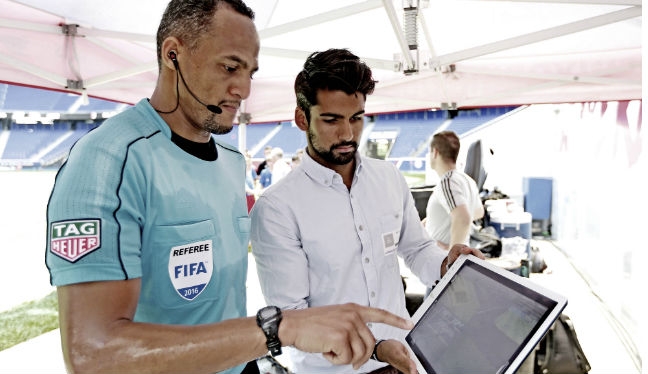Play of the Week 8: Advantage and quick free-kicks

By PRO Training & Development Manager Paul Rejer
In Play of the Week 8 we are discussing the role of the referee in two areas of the game which can be interlinked; when or when not to utilize the advantage clause or allow quick free-kicks.
The first play is from the game between Real Salt Lake and Atlanta United. RSL’s Demar Phillips plays the ball past United’s Hector Villalba, who then deliberately handles it.
In the background, from a great position, referee Ricardo Salazar goes to put his whistle to his mouth but then sees Phillips keep possession of the ball and plays advantage by using the ‘new’ one-armed signal.
Phillips plays the ball wide to teammate Joao Plata, who passes inside to Luke Mullholland. He then tees up Albert Rusnak to score a tremendous goal from outside the penalty area. A great team goal, to which the referee made a significant contribution – an example of every referee’s dream!
In the second play, from the game between New York Red Bulls and Columbus Crew, we see a foul challenge on Red Bulls’ Felipe Martins by Crew’s Ethan Finlay. Referee Jorge Gonzalez immediately stops play, awards a free-kick to the Red Bulls and issues a yellow card to Finlay. The ball goes straight to Red Bulls’ Fredrik Gulbrandsen, who immediately protests as he wanted an advantage to be played, but his protests are short-lived.
There is no question that the referee could have played advantage in this situation. Let’s examine what referees must consider when deciding to play advantage.
– Skill level? The players at this level are certainly skillful enough to utilize the advantage
– Conditions of the Field of Play? Perfect playing conditions
– Position on the Field of Play? Good attacking position
– Temperature of the match? Not particularly high
– Control of the ball? Well under control
– Seriousness of the tackle? Certainly a yellow but not serious
– Attacking opportunity? Good opportunity
There is also a case to consider the following:
– State of the match? (e.g. score and time)
– Referee’s Match Control?
– What does the offended team want?
With the Red Bulls in a winning 2-0 position and this being in the 83rd minute, what is best for them? A ‘promising’ attack from which they could lose possession and be put under pressure on a counter attack is not as advantageous as a ceremonial free-kick which typically takes over a minute to restart.
Gonzalez knows at this stage they would prefer to slow things down and legally consume time. What’s in it for the referee? At this late stage, Gonzalez implements no-risk safe refereeing, not taking the chance of the temperature rising and preventing any possible retaliation.
Following the yellow card, we see a nice moment with obvious mutual respect between the experienced Gonzalez and Finlay. They act more like old pals in a bar rather than the referee and a player that has just been cautioned!
The third play is from LA Galaxy versus Seattle Sounders where Sounders’ Cristian Roldan commits a foul challenge on Galaxy’s Romain Alessandrini in the center circle.
Referee Ismail Elfath correctly awards a free-kick to Galaxy. Alessandrini, who can see Jermaine Jones free on the right, takes the free-kick quickly and Jones has a genuine goal scoring opportunity. Elfath stops the game to caution Roldan for stopping a promising attack.
The laws of the game state:
“Delaying the restart of play to show a card. Once the referee has decided to caution or send off a player, play must not be restarted until the sanction has been administered”
So Elfath is certainly correct in law as he believes a yellow card is warranted, but is he correct in the spirit of the game? After examining the considerations for advantage earlier, similar deliberations are required for a quick free-kick as both are naturally entwined, but what would the offended team want? In this situation, would Galaxy want a clear goal scoring opportunity or a free-kick in the center circle and a yellow card to an opponent?
If this foul was reckless – a mandatory yellow or red card – and there was a danger of his control being jeopardized, then the referee would be absolutely correct to stop the quick free-kick.
This was not an unequivocal yellow card, though, so if the referee had allowed the play to proceed and a goal was scored this would have been regarded as amazing vision and utilization of the advantage clause from the referee. Galaxy would have been delighted and there wouldn’t have been any complaints from the Sounders either.
With so many recent law changes that have benefited the game, perhaps a change to the law in this situation would also be beneficial. When a referee plays advantage, he can return to the perpetrator the next time the ball is out of play to caution him. So why should it be any different in quick free-kick situations, particularly in a case like this, when there is an obvious advantage to the offended team?
Knowing he could caution Roldan as soon as play is stopped, Elfath would have allowed play to proceed, Galaxy would have had their goal scoring opportunity and Elfath would have been able to caution Roldan, in the same manner as an advantage situation.
Or perhaps, as happens so many times, when the advantage has been realized, having had that period of time to reconsider, the referee may decide not to caution. At least he would have that option.
In summary, we have discussed the responsibility of the referee at advantage situations, and the considerations and criteria he must evaluate. The most important must be, what is best for the offended team? What would they prefer? And, are my actions benefiting the offended team or penalizing them?
Whatever the referee decides, he can never risk his match control!
